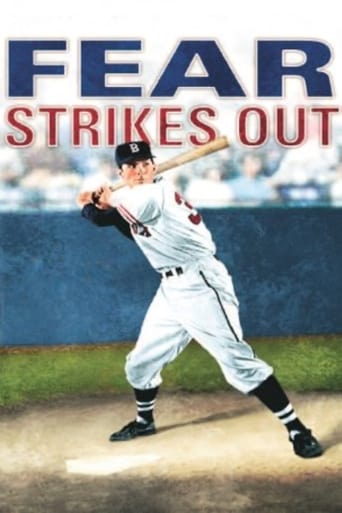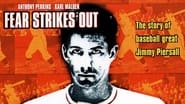thejcowboy22
Karl Malden stomps all over this movie with a demonstrative performance of an over domineering Father. Anthony Perkins gives an almost equal performance as Jimmy Piersall Major league ballplayer. From young Jimmie's High school days in Connecticut to Scranton, PA and on to the Red Sox. Jimmy tried to please his Dad in his attempt to make the Major Leagues. When Jimmy finished third in a batting race in the minor leagues. Father Piersall took the wind out of Jimmie's sails by snubbing the effort which was the common theme in causing Jimmie's apparent metal breakdown. Both actors melded well against each other and I liked the stark expressions on Perkins face as the forceful Father picks at him time after time pushing Jimmy over the edge. Fine job of acting as well for the curious Psychiatrist Doctor Brown (Adam Williams) as a restrained Piersall in full straight jacket is fighting to get out for more physical violence. Dr. Brown just looks at the tragic ball player and say quite simply, "So your Jim Piersall!" Mr. Piersall tries to undermine the Doctor by sneaking into the hospital against his orders of visiting his very disturbed son. All I can tell you is leave the flowers and candy at home. Perkins acting was adequate until he picked up a baseball. The real Jimmy Piersall was flabbergasted by seeing his self portrait destroyed on screen by a lanky doofus who throws a ball like a girl. Other goofs mare this sports drama as Jimmy seems to wear a different uniform from the rest of the team. The Physical aspects were overlooked by director Robert Mulligan as Anthony Perkins can stab a woman in a shower with vigor in Psycho, but on a ball field his body language reminded me more of Tommy Tune or Richard Chamberlain. I grade this attempt four out of ten Red Sox tickets.
classicsoncall
My favorite series of baseball cards as a kid was the 1958 Topps set, and I remember having a Jim Piersall in the mix. So that was two years after this film came out, and I never knew about Piersall's struggle with mental illness until a little while ago, prompting me to seek out this picture. Once the story gets under way, it reveals a rather simplistic yet very real trauma in the life of young Piersall, a domineering father vicariously living his dreams through the efforts and success of his son. Karl Malden and Anthony Perkins effectively portray their respective characters, and the story pretty much see-saws it's way between Jimmy's attempts to live up to his father's expectations and generally failing to meet them. When Jimmy proudly declares he's third in the minor leagues in hitting, Dad's response is "Well, that isn't first". There's only so much of that you can take.Interestingly, there were understated references to the idea that mom Piersall (Perry Wilson) was also troubled with bouts of depression and mental illness. Her frequent absences from home and family was mentioned a couple times, and I took that as a subtle hint that young Piersall might have been prone to his condition by virtue of heredity and reinforced by the demands of the father. Another reviewer mentions this, and though I haven't verified it myself, it was something that crossed my mind while watching the film.One thing that could have been handled better by the film makers would have been to put the story into a historical time line. As I mentioned earlier, I can place Piersall in context playing baseball during my own youth, but it would have been helpful if the movie offered places and dates with on screen graphics. For example, Piersall reached the Majors in 1950 after signing on with the Red Sox organization a couple of years earlier. No mention of teammates or well known opposing players was ever mentioned, thereby missing an opportunity to depict how others around him were reacting to his behavior. We did get that one fight near the dugout and the climb up the fencing to set up his hospitalization but a little more context would have been helpful.I thought Anthony Perkins was pretty effective in his portrayal here; he gets those spooky eyes every now and then like the time he found himself alone at night in the empty stadium. I could see how it was the sort of thing that would recommend him for the role of stuffing birds in Hitchcock's "Psycho". As for the real life Jimmy Piersall who's still alive, he went on to a fairly successful big league career encompassing seventeen seasons. It was with a bit of whimsical insight that he wrote in his autobiography - "Probably the best thing that ever happened to me was going nuts. Who ever heard of Jimmy Piersall, until that happened?"
fab_max
Astonishing how obsessive some people can get when it comes to their favourite sports. Thankfully in Europe baseball is hardly known, which allows us to get beyond appearances and enjoy one of the most honest, emotionally raw acting ever recorded on film. This is one of Anthony Perkins' best performances ever - the fact that it was only his third movie makes it even more amazing, but obviously Academy voters in that year had too much baseball in their minds to appreciate such a wonderful, unique actor. The first time I saw this film I was a 9 year old with some father issues. This film was a huge shock and got me interested in psychotherapy at a very early age. Many scenes stayed embedded in my mind for years: Tony in the baseball field alone at night, his breakdown in the field, his fear of his father when he has an accident, all his exchanges with his father.... It's not just a tremendous acting turn, though. It's a beautiful, mature, realistic movie, the kind they used to make at that time in Hollywood (influenced by TV drama and Italian neo-realism) and they seemed to have forgotten how to make in this Lords of the Star Wars of Narnia age of childish entertainment. It could be used as an exhibit in the case for the regression to childhood of the American consciousness. I've read Tab Hunter's enormously entertaining book - which I recommend to any lover of Hollywood's golden age - and even he admits he couldn't have made a better job than Tony did. Once in a while the right part goes to the actor who deserves it most. Fear Strikes Out is a true classic and Anthony Perkins' acting is a masterclass of the first order, with as much fire and urgency as anything by Brando and Dean. In fact, as a film director, I'm showing this film to the young leading man in my next movie as reference and inspiration. Wish me luck!
bkoganbing
As a previous reviewer said Anthony Perkins did not exactly look like Frank Merriwell out on the field during the baseball scenes, but the film is about the true story of Boston Red Sox centerfielder Jimmy Piersall who sustained a nervous breakdown and then came back to have a pretty respectable major league career.Showing the personal road Piersall took towards that breakdown is where Anthony Perkins gives one of his great film performances. This film is a lot like I'll Cry Tomorrow where Jo Van Fleet was pushing the career of her daughter Susan Hayward as Lillian Roth so she could have the success that her daughter had vicariously.That's where the other great performance in the film comes in. Karl Malden is the baseball father, someone with the same dreams, that his son become a major league ballplayer. Malden's success involved being on his factory team, he wanted more and when he couldn't have it drove his son relentlessly to learn the skills and make the grade. But it was some price for Piersall to pay.I remember Jimmy Piersall as a player when I was a lad. He played for the Red Sox in the years of the Casey Stengel Yankee juggernaut. He was a good contact hitter, didn't hit much for power, but played a flawless centerfield. The Red Sox in the Fifties had little to cheer about. There was a pitching staff of Mel Parnell and a bunch of nobodies. There infield was from hunger with the exception of third baseman Frank Malzone who came up in 1956 the last year Parnell played. But the outfield gave New England something to cheer about with Piersall in center, Jackie Jensen in right, and Ted Williams playing with his back to the Green Monster in left. Piersall covered so much ground in center field he made it real easy on both Williams and Jensen. The Red Sox let him go to the expansion Los Angeles Angels in 1961 where he finished his career. Still he's a Red Sox legend.The story had been previously done on TV's Climax Theater with Tab Hunter as Piersall. In his recent memoirs Tab said that he had hoped to do the screen version. At the time he was involved in a relationship with Anthony Perkins. Unbeknownst to Hunter, Perkins lobbied and got the part in the film. That sort of put a damper on the relationship.I also echo other reviewers in wishing that some of Piersall's teammates and others in the Red Sox organization had been portrayed. Only Joe Cronin who was the General Manager at the time is shown on the screen. Legendary owner Tom Yawkey is not portrayed and that is a pity.Interestingly enough Piersall may have gotten his chance with the Red Sox because of Joe Cronin's racist policies. The Red Sox were the last team in the major leagues to integrate. I remember that very well when Pumpsie Green became their first black player two years after Fear Strikes Out was released. Fear Strikes Out is unfortunately a two person show with Perkins and Malden the only really developed characters in the film. But those are two very talented persons indeed.


